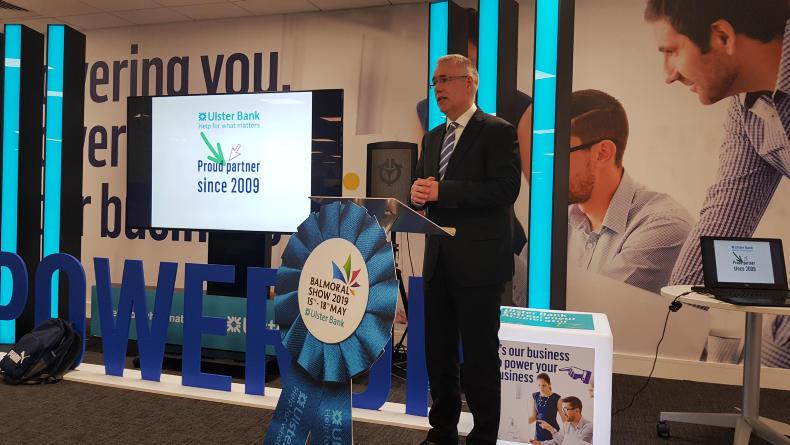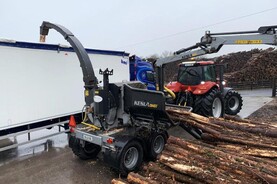Poultry farmers who are still repaying loans for biomass boilers installed under the Renewable Heat Incentive (RHI) are considering borrowing more money to switch to gas.
At an event in Belfast on Wednesday, Cormac McKervey from Ulster Bank said although the new RHI tariff delivers around £2,000 per boiler annually, when servicing and running costs for biomass boilers are considered, the reduced tariff is “as good as zero”.
“Some farmers have come back looking for more funding to install gas heaters. This means they have debt over something that is not generating any income, plus new debt for gas boilers,” he said.
Ulster Bank has carried out an exercise internally to see how the new RHI tariff
will affect farmers.
“Some of them will be fine. There are quite a few in the middle who will certainly come under pressure and there are some who really are going to have a difficult time,” McKervey said.
Further pressure is also coming on poultry farmers from Moy Park where an oversupply of poultry meat has led to reduced throughput on broiler units.
Listen to "Agricultural borrowings in NI" on Spreaker.
“Most farmers will be able to absorb that, but any discussions around trying to cut flesh price for birds will have a huge effect. We would be very wary of that, it’s not something we want to see happening,” McKervey said.
Giving an overview of agricultural lending across sectors, McKervey said that margins have tightened on some farms due to higher costs and reduced prices, but loans are still being repaid as planned.
“Cashflow is not under any great pressure and overdrafts are fluctuating as normal,” he maintained.
Borrowing and investing
In the past 12 months, farmers setting up contract pig finishing units have been active in borrowing money as well as dairy farmers that are buying land or investing in sheds and milking parlours.
McKervey said that a significant number of suckler farmers that are converting to dairying have also been borrowing money.
“They generally go in with 50-70 cows. Their existing stock have been sold to buy the cows and we provide funding for the parlour or robot and conversion of the sheds,” he said.
Read more
RHI cuts to hit loan repayments
Moy Park to cut NI production
Poultry farmers who are still repaying loans for biomass boilers installed under the Renewable Heat Incentive (RHI) are considering borrowing more money to switch to gas.
At an event in Belfast on Wednesday, Cormac McKervey from Ulster Bank said although the new RHI tariff delivers around £2,000 per boiler annually, when servicing and running costs for biomass boilers are considered, the reduced tariff is “as good as zero”.
“Some farmers have come back looking for more funding to install gas heaters. This means they have debt over something that is not generating any income, plus new debt for gas boilers,” he said.
Ulster Bank has carried out an exercise internally to see how the new RHI tariff
will affect farmers.
“Some of them will be fine. There are quite a few in the middle who will certainly come under pressure and there are some who really are going to have a difficult time,” McKervey said.
Further pressure is also coming on poultry farmers from Moy Park where an oversupply of poultry meat has led to reduced throughput on broiler units.
Listen to "Agricultural borrowings in NI" on Spreaker.
“Most farmers will be able to absorb that, but any discussions around trying to cut flesh price for birds will have a huge effect. We would be very wary of that, it’s not something we want to see happening,” McKervey said.
Giving an overview of agricultural lending across sectors, McKervey said that margins have tightened on some farms due to higher costs and reduced prices, but loans are still being repaid as planned.
“Cashflow is not under any great pressure and overdrafts are fluctuating as normal,” he maintained.
Borrowing and investing
In the past 12 months, farmers setting up contract pig finishing units have been active in borrowing money as well as dairy farmers that are buying land or investing in sheds and milking parlours.
McKervey said that a significant number of suckler farmers that are converting to dairying have also been borrowing money.
“They generally go in with 50-70 cows. Their existing stock have been sold to buy the cows and we provide funding for the parlour or robot and conversion of the sheds,” he said.
Read more
RHI cuts to hit loan repayments
Moy Park to cut NI production






 This is a subscriber-only article
This is a subscriber-only article










SHARING OPTIONS: